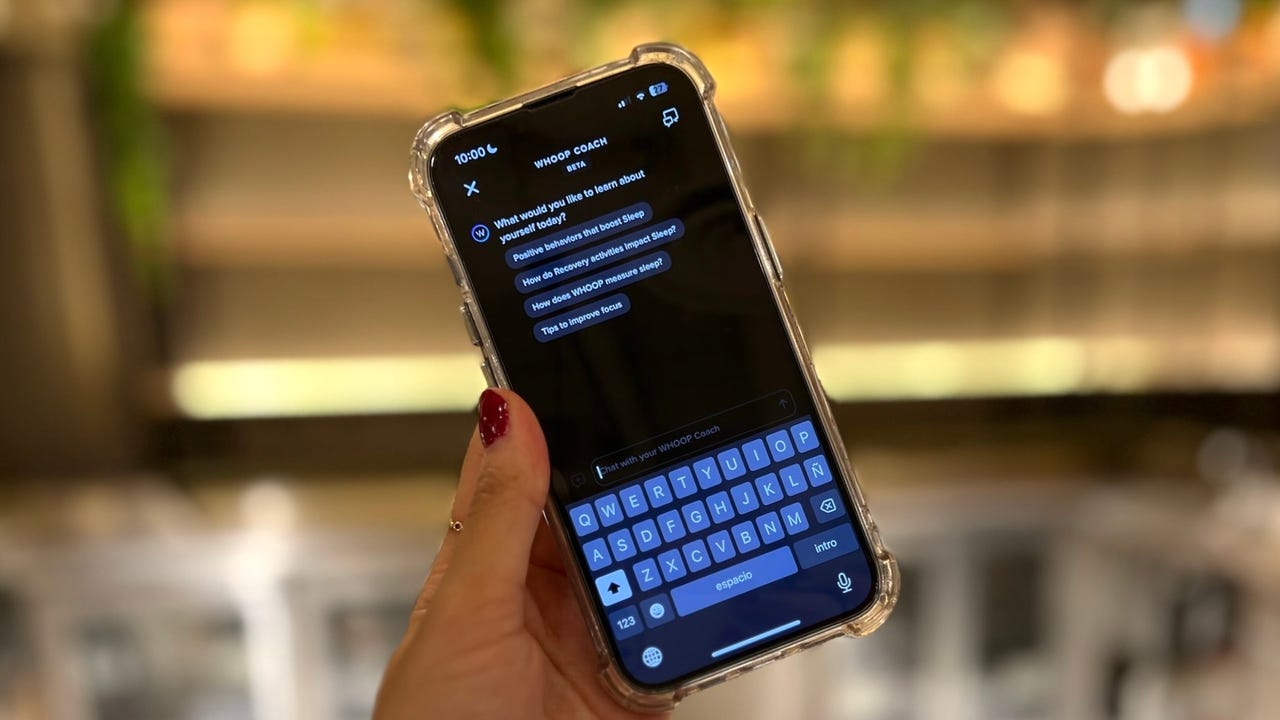
































The Whoop 4.0 has been a standout among fitness trackers because of its unique design -- a band without a screen.
If the name of it sounds familiar, it's likely because you've seen one of a famous athlete wearing the device on a TV commercial. Since its launch in 2020, the Whoop has been endorsed by elite athletes, including Patrick Mahomes, LeBron James, Tiger Woods, and Michael Phelps. There has to be more to the band than what they're getting paid to say, right?
Also: The best smartwatches you can buy: Apple, Samsung, Google, and more compared
In September, Whoop unveiled Whoop Coach, a GPT-4-supported conversational chatbot that can deliver personalized recommendations and fitness coaching based on the user's data. The addition of Whoop Coach is an attempt to expand the device's target audience, giving everyone, regardless of athletic experience, the ability to understand their biometric data and take steps toward improving their health. So I gave it a try.
The Whoop 4.0 is a fitness tracker with a sleek, screenless design that can provide in-depth analytics of your human performance.
For the record, this review goes into detail of the Whoop Coach in specific; my colleague Matthew Miller broke down the Whoop hardware when it first released.
To understand if Whoop Coach is helpful, we first need to understand the biometric data that the Whoop 4.0 tracks. Whoop says it captures the "most meaningful biometric data" for your health: sleep activity, strain, and recovery. Strain refers to how much exertion you put on your body from daily activities, which includes exercise work, anxiety, and more. Recovery measures how your body adapts to those stresses.
Also: Whoop unveils a ChatGPT-powered AI coach. Here's how you can access it
Although these metrics might seem straightforward, they can be difficult to understand, since so many different factors affect the score. As a result, it can take some time to grasp what and why things are happening.
The Whoop app's user interface can also be intimidating at first, with all the data displayed on graphs that aren't the easiest to understand, as seen in the photo below.
If you have ever used ChatGPT, the Whoop Coach experience is nearly identical. As soon as you open the Whoop app, you can begin typing into a text prompt to chat with the AI bot. You can ask questions as broad or as specific as you'd like, and it will likely give you a detailed, helpful response. At least that's what I've gotten.
For example, when I asked, "What does a recovery rate of 9% mean?", the Whoop Coach provided a detailed explanation informing me that I was in the recovery red zone and, as a result, my body needed proper rest and recovery due to high stress, insufficient sleep, or other factors.
Review: Whoop 4.0: Screenless wearable helps you avoid injuries, track sleep details
The feedback was an accurate assessment of my activity on that day because I had just gotten off a seven-hour flight with a red eye and the most turbulence I had ever experienced.
You can also use the Whoop Coach's data to help you improve your performance. For example, in response to the poor recovery score, I asked, "What action can I take to get a proper recovery?" Whoop Coach gave me six detailed bullet points of things I could do to have an improved recovery score in the future.
Lastly, you can use Whoop Coach for general queries that don't involve your data at all, such as, "How many hours is considered a good night's sleep?"
Also: These are the 7 best (and most accurate) sleep trackers you can buy
All in all, my experience chatting with the Whoop Coach left me impressed. The app could answer all my fitness and health questions, and I had a lot of queries -- especially when I first got the device and tried to familiarize myself with its metrics.
Ultimately, if you want to access comprehensive biometric data and are willing to take action every day to improve your health, theWhoop is an incredible device to have on hand. You'll just have to shoulder the cost of the subscription -- the actual band in the default black color comes free -- for$30 a month or$239 upfront for a year.
The metrics that Whoop tracks provide valuable insight into the relationship between your physical activity, mental load, and recovery phases. Integrating the Whoop Coach ensures that you understand the data, so that you can make immediate, effective changes.
However, if you are just embarking on your wellness journey -- and all you really want from a fitness tracker is the general metrics (heart rate, calories, steps, etc.) -- then there are plenty of other wearables on the market that are easier to understand, have a lower price point, and have other bells and whistles that you can benefit from.
 Tags quentes :
Vestíveis
Tags quentes :
Vestíveis